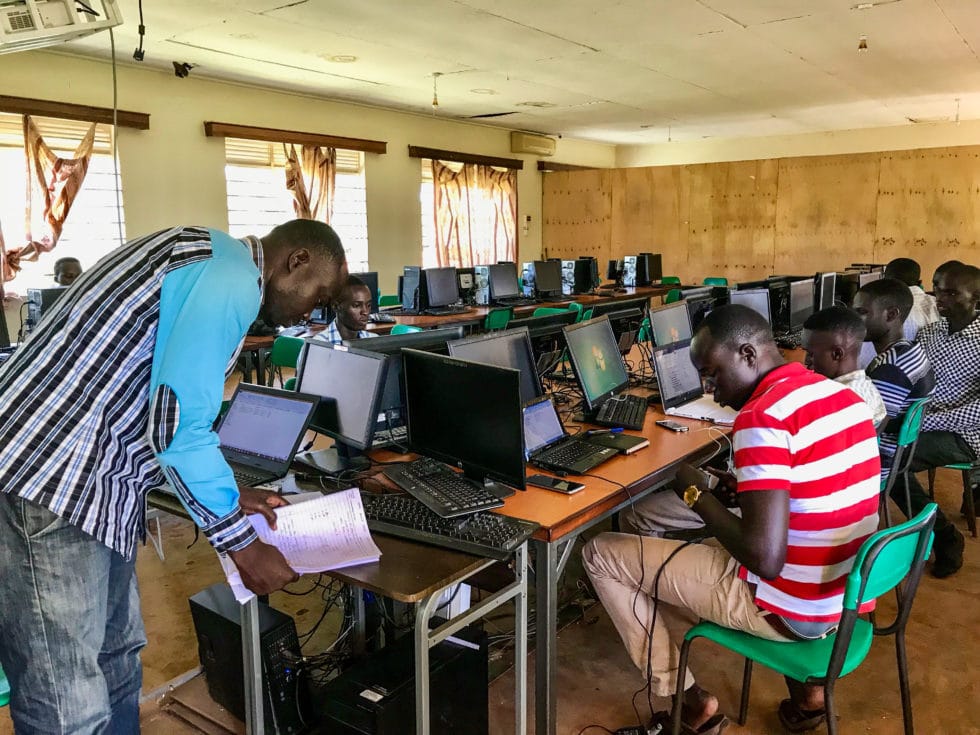Free internet access transformed research, teaching and learning. A story of change from Gulu University
18-01-24

The expansion of internet access at Gulu University was a gradual process, but when, thanks to phase three of the Building Stronger Universities programme, bandwidth was increased to 133 mbps and the international Wi-Fi internet access roaming service, eduroam, was introduced, things took off. There was now free internet access for all, and academic staff and students managed to acquire the gadgets they needed to get on board. This led to a boom in the active participation of students. Online teaching, research, learning and social interaction are now the new normal at Gulu University thanks to the power of internet access for all!
By Robert Ringtho, Assistant Academic Registrar, Gulu University
Gulu University is one of Uganda’s nine public universities. It was established in 2003 with two faculties: the Faculty of Agriculture and Environment and the Faculty of Education and Humanities. Today, the university has six faculties, two institutions, two campuses and one constituent college. Our motto is “Transforming the Community”.
The internet has been available at Gulu University from the outset, but for many years access to it was extremely limited. There were many reasons. Not only was the national telecommunications infrastructure weak but the university lacked the basic institutional internet infrastructure and necessary equipment and tools to support internet access. This included such things as bandwidth subscriptions, laptops, iPads, smart phones and the like. Therefore, up until a decade ago, internet access was basically only for those who could afford to invest in it on their own.
However, making internet access freely available in the interest of research and learning continued to be a critical issue for the university. In 2011, when the Building Stronger Universities (BSU) programme was launched at Gulu University, the university had an internet bandwidth of 2mbps monthly and its use was restricted to key administrators and to the university library. With support from the BSU programme, internet bandwidth was raised to 5mbps under BSU1, to 10mbps under BSU2, and to 30mbps under BSU3. Although this was still below the desired bandwidth, it significantly increased internet access for both students and staff.
Through BSU3’s engagement with the Research Education Network of Uganda (RENU) and with co-funding from the university, the internet bandwidth has since been increased to 133mbps, and this has significantly improved internet access and services across the university. Under this arrangement, BSU3 also supported the introduction of eduroam, an international Wi-Fi internet access roaming service for users in research, higher education and further education. It enables students, staff and researchers to access the internet while on and off campus at their convenience. As a result, academic staff and the students now participate actively in research, teaching and learning activities.
Two students I interviewed about their experiences of internet access had this to say:
Student #1: “I am able to access the internet while on the campus. The internet is now faster and stable. Since I was set up on the university wireless internet (eduroam), I access the internet automatically whenever I am on the campus and sometimes when I am off campus – where there are eduroam hotspots. I use the internet mainly for accessing OERs and writing course works. Sometimes we use the internet to follow online lessons on YouTube.”
Student #2: “Internet access is Gulu University is free for all students. Many students used it to access reading materials to supplement their lecture notes and do their course work and research. However, the internet is mainly accessible around the library, BSU containers and the AR’s block. It is also fastest from 7:00am – 10:00am and from 7:00pm – 10:00pm. Otherwise, the internet is overloaded as everyone is trying to access it at the same time. I think the university should create more access points for the internet.”
Some classes have been fully or partially shifted online, allowing students and staff alike a certain amount of flexibility. For instance, on our arrival at MS TCDC on 29 October 2023, Assoc. Prof. Okumu Charles was able to conduct a lecture with his graduate class back at Gulu University at the suggestion of a student. All he had was his smart phone and the TCDC internet connection to teach the students online.
As Assistant Academic Registrar, I also benefit from the eduroam service in Gulu University. While I am here in Tanzania, I can access the Academic Management Information System (ACMIS) staff portal. The system allows me to manage results, student records, academic documents production, programmes and course units in real time. All the students have to do is to send me an email or WhatsApp message be served online.
The initial intention of BSU3’s internet support was to build institutional capacity in research and online teaching in Gulu University. An unexpected outcome of the increased access to the internet is the rise in both staff and student driven blended teaching and learning.
Although the university has not gone so far as to provide users with the necessary gadgets, both staff and students have managed to acquire them themselves. To date, nearly all the teaching staff have personal laptops and smart phones and about 90% of the students have at least a smart phone.
Online teaching, research, learning and social interaction are now the new normal at Gulu University – thanks to the power of free internet access for all!
Thanks to the Ministry of Foreign Affairs in Denmark, Danida Fellowship Centre (DFC) and BSU III.
Edited by Kate Girvan
Go back to our stories
